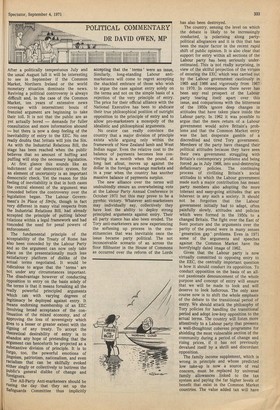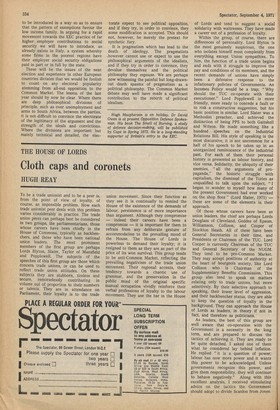POLITICAL COMMENTARY DR DAVID OWEN, MP
After a politically tempestuous July and the usual August lull it will be interesting to see in September if the Common Market, Northern Ireland or the world monetary situation dominate the news. Reviving a political controversy is always difficult and, in the case of the Common Market, ten years of extensive news coverage with intermittent bouts of frenzied argument are beginning to take their toll. It is not that the public are as yet actually bored — demands for fuller consultation and more information abound — but there is now a deep feeling of the Inevitability of entry to the EEC. No one really doubts that Isritain will join the Six. As with the Industrial Relations Bill, the stage has been reached when the public believes that no amount of huffing and puffing will stop the necessary legislation.
At first glance this sounds like an indictment of our democratic system, for an element of uncertainty is an important democratic check. Yet the reason for this feeling of inevitability is that in both cases the central element of the argument was conceded before the controversy over the legislation began. The Labour Governrnent's In Place of Strife, though in fact very different in many vital respects from the Industrial Relations Bill, had already accepted the principle of putting labour relations within a legal framework and had conceded the need for penal powers of enforcement.
The fundamental principle of the acceptability of the Treaty of Rome has also been conceded by the Labour Party and so the argument can now only take place on the presentationally much less satisfactory platform of dislike of the actual terms negotiated. It would be ridiculous to argue that the 'terms' are not under any circumstances important. The disadvantage however of conducting Opposition to entry on the basis solely of the terms is that it means forsaking all the really powerful principled arguments Which can with varying degrees of legitimacy be deployed against entry. It means endorsing membership of an EEC involving broad acceptance of the continuation of the mixed economy, and of approving the loss of sovereignty which goes to a lesser or greater extent with the Signing of any treaty. To accept the theoretical desirability of entry is to abandon any hope of pretending that the argument can henceforth be projected as a substantive division of principle. It is to forgo, too, the powerful emotions of Jingoism, patriotism, nationalism, and even racialism that can be skilfully evoked either singly or collectively to buttress the Public's general dislike of change and foreigners.
The All-Party Anti-marketeers should be rueing the day that they set up the Safeguards Committee thus implicitly accepting that the ' terms ' were an issue, Similarly, long-standing Labour antimarketeers will come to regret accepting the shackled embrace of those who wish to argue the case against entry solely on the terms and not on the simple basis of a rejection of the very principle of entry. The price for their official alliance with the National Executive has been to abdicate their true philosophical position of outright opposition to the principle of entry and to allow pro-marketeers a monopoly of the idealistic and philosophical arguments.
No orator can really convince the country that a major division of principle exists while arguing only within the framework of New Zealand lamb and West Indian sugar. Even the relative cost to the balance of payments becomes less convincing in a month when the pound, at long last afloat, moves up against the dollar in the foreign exchange markets and in a year when the country has another massive balance of payments surplus.
The new alliance over the terms will undoubtedly ensure an overwhelming vote at the Labour Party Annual Conference in October 1971 but this may prove to be a pyrrhic victory. Whatever anti-marketeers may individually say, collectively they have lost the ability to deploy strong principled arguments against entry. Their all party stance has also been eroded. The Tory anti-marketeers are now experiencing the softening up process in the constituencies that was inevitable once the issue became party political. The not inconceivable scenario of an across the floor fillibuster in the House of Commons as occurred over the reform of the Lords has also been destroyed.
The country, sensing the level on which the debate is likely to be increasingly conducted, is polarising along partypolitical allegiances and it is this that has been the major factor in the recent rapid shift of public opinion. It is also clear that support for entry within all sections of the Labour party has been seriously underestimated. This is not really surprising, in view of the skilful projection of the virtues of entering the EEC which was carried out by the Labour government cautiously in 1965 and 1966 and vigorously from 1967 to 1970. In consequence there never has been any real prospect of the Labour party tearing itself apart over this issue, and comparisons with the bitterness of the 1950s ignore deep changes in attitudes that have taken place inside the Labour party. In 1962 it was possible to argue that the mere return of a Labour government would solve Britain's problems and that the Common Market entry was the last desperate gamble of a discredited and tired Tory government. Members of the party have changed their political attitudes because they have seen their own government struggling with Britain's contemporary problems and being forced ,as in July 1966, into soul-destroying deflationary policies. The continuing process of civilising Britain's social attitudes to which the Labour government made such a major contribution has meant party members also adopting the more tolerant and easy-going attitudes that are inherent in any such a society. It should not be forgotten that the Labour government initially had to adapt, often painfully slowly, attitudes and policies which were formed in the 1950s to a changed Britain. The fight over the East of Suez posture and the arguments over the parity of the pound were in many senses 'generation gap' problems. Even in 1971 some of the arguments and speeches against the Common Market have the horrifyingly dated image of 1962.
Given that the Labour party is now virtually committed to opposing entry to the EEC, the centrally important question is how it should conduct its opposition. To conduct opposition on the basis of an allout passionate denouncement of the whole purpose and concept of entry will ensure that we will be made to look and will deserve to look ludicrous. The only sane course now is to shift the whole emphasis of the debate to the transitional period of entry. We should attack the philosophy of Tory policies for handling the transitional period and adopt low-key opposition to the actual terms. The country will listen more attentively to a Labour party that presents a well-thoughtout coherent programme for shielding the most vulnerable section of the community during a period of change and rising prices, if it has not previously devalued itself by a shrill and discordant opposition.
The family income supplement, which is wrong in principle and whose predicted low take-up is now a source of real concern, must be replaced by universal family allowances linked to the tax system and paying the far higher levels of benefit that exist in the Common Market countries. The value added tax will have to be introduced in a way so as to ensure that the pattern of exemptions favour the low income family. In arguing for a rapid movement towards the EEC practice of far higher employer contributions to social security we will have to introduce, as already exists in Italy, a system whereby some firms in the poorest regions have their employer social security obligations paid in part or in full by the state.
These will be the issues of the next election and experience in other European countries dictates that we would be foolish to count on any electoral popularity stemming from all-out opposition to the Common Market. The lesson of the last year should by now be clear. Where there are deep philosophical divisions of principle, such as over unemployment and arms to South Africa, between the parties, it is not difficult to convince the electorate of the legitimacy of the argument and the strength of the ideals and convictions. Where the divisions are important but mainly technical and detailed, the elec torate expect to see political opposition, and if they try, in order to convince, they some modification is accepted. This should not, however, be merely the pretext for synthetic fury.
It is pragmatism which has lead to the death of ideology. The pragmatists ,however cannot use or expect to use the philosophical arguments of the idealists, and if they try in order to convince, they devalue themselves and the political philosophy they espouse. We are perhaps now witnessing the painful but long-drawnout death spasms of pragmatism as a political philosophy. The Common Market debate may well have made a significant contribution to the rebirth of political idealism.
Hugh Macpherson is on holiday. Dr David Owen is at present Opposition Defence Spokesman. His book The Smell of Burning, a study of defence decision-making, will be published by Cape in Spring 1972. He is a long-standing supporter of Britain's entry to the EEC.



































 Previous page
Previous page